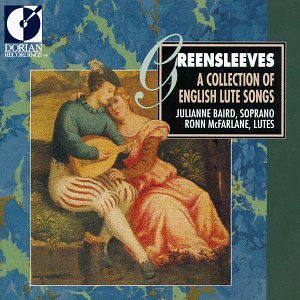
This recording hails from 1989 but I didn't get a hold of it until 1993 (I'm pretty certain of that date because I was working on songs from that repertoire for a recital in school). And this was a cd I didn't really buy: it came via a friend who had some sort of BMG mailing cd arrangement (like get 10 cds for a $1 or something like that). Anyway I dug/dig it. The playing and singing are both done deftly.
My favorite tune is Dowland's "Come Again", though I'm not entirely on board with the handling of the "To see, to hear, to touch..." section. It would've been nice to have Dowland's "Come, Heavy Sleep" but they can't include the entire repertoire, especially when the scope is broad composer wise.
Not all of the pieces are duets: there's a fair number of solo lute works thrown in, and they're played beautifully. As a guitarist I feel that these pieces sit on the guitar well, but it's always nice to hear them on lute: they're "lighter" if you will (they're also higher in pitch unless you correct for that on the guitar with a capo). The anonymous "Bonny Sweet Boy" was a nice surprise: it's a very melancholy piece, and kind of short.
One definite thing worth mentioning -- with a view to bridging what might seem prima facie as disparate styles of music -- is that this kind of Renaissance lute music is highly improvisational. That's not really true of the ricercare of da Milano, for instance, but in these stylized dance pieces it's really the case. I'm thinking particularly of the solo music, but it's also easy to imagine a lute accompanist spontaneously adding passages (or licks if you will) and experimenting to make the music as interesting and beautiful as possible (and not dull and the same every time). If you'd like to see that in action I would certainly recommend as a starter Frederick Noad's Renaissance Guitar book. It has solos, duets and songs. There's also a good book of only solo music by the Japanese Zen-on Guitar Library simply entitle Renaissance Guitar. I'm not so sure it's in print anymore: you can check out the Japanese site here: Zen-On. A used copy shouldn't be too hard to run down I'd think.
No comments:
Post a Comment